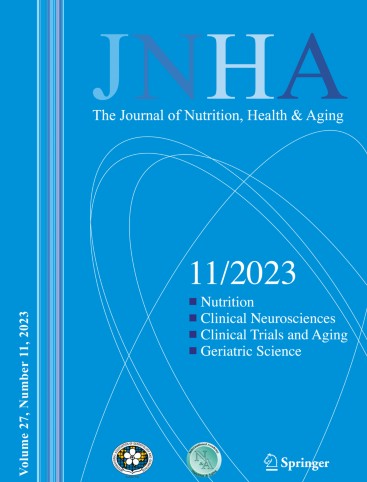Association between Mediterranean diet adherence and Parkinson's disease: a systematic review and meta-analysis
IF 4.3
3区 医学
Q1 GERIATRICS & GERONTOLOGY
引用次数: 0
Abstract
Background and aims
Parkinson's disease (PD) is a chronic neurodegenerative disorder, and past research suggests that adherence to the Mediterranean diet (MD) may influence the risk of PD. However, there are varying conclusions among different studies regarding the correlation between long-term adherence to the MD and the occurrence of PD. This meta-analysis aimed to investigate the association between MD adherence and PD incidence.
Methods
This meta-analysis was registered on PROSPERO (CRD42024520410). We searched PubMed, Embase, Web of Science, and Cochrane databases to identify observational studies, including prospective cohorts, case-control, and cross-sectional studies, up to February 2024. Studies reported on MD adherence were included, with MD adherence categorized through a quantifying score or index. The pool odds ratios (ORs) and 95% confidence intervals (CIs) were calculated for the highest versus the lowest categories of MD score in relation to PD risk, using random-effects models. Additionally, bias assessment, heterogeneity assessment, sensitivity analysis, and subgroup analysis were performed. A total of 12 studies were included in the meta-analysis.
Results
The overall effect size of PD risk was as follows: compared to the lowest adherence to the MD, the highest adherence to MD showed a significant negative correlation with the incidence of PD, with an overall OR of 0.75 (95% CI: 0.66, 0.84). Specifically, in studies diagnosing PD, the overall OR was 0.83 (95% CI: 0.74, 0.94), while in studies diagnosing prodromal Parkinson's disease (pPD), the overall OR was 0.67 (95%CI: 0.59, 0.76). For individuals aged <60 years, the overall OR was 0.70 (95%CI: 0.62, 0.78), whereas, for those aged ≥60 years, the overall OR was 0.86 (95%CI: 0.74, 0.99).
Conclusions
The evidence from this meta-analysis demonstrates a significant negative correlation between adherence to MD patterns and the risk of PD, suggesting that the MD may serve as a protective factor for PD. This dietary pattern may be particularly beneficial in reducing the risk of pPD.
地中海饮食与帕金森病之间的关系:系统回顾和荟萃分析
背景和目的:帕金森病(PD)是一种慢性神经退行性疾病,过去的研究表明,坚持地中海饮食(MD)可能会影响PD的风险。然而,关于长期坚持MD与PD发生之间的相关性,不同的研究得出了不同的结论。本荟萃分析旨在调查MD依从性与PD发病率之间的关系。方法:本荟萃分析在PROSPERO注册(CRD42024520410)。我们检索了PubMed、Embase、Web of Science和Cochrane数据库,以确定观察性研究,包括前瞻性队列、病例对照和横断面研究,截止到2024年2月。纳入了关于MD依从性的研究报告,通过量化评分或指数对MD依从性进行分类。使用随机效应模型计算MD评分与PD风险相关的最高和最低类别的池优势比(ORs)和95%置信区间(ci)。此外,进行偏倚评估、异质性评估、敏感性分析和亚组分析。meta分析共纳入了12项研究。结果:PD风险的总体效应大小如下:与最低依从性MD相比,最高依从性MD与PD发病率呈显著负相关,总体OR为0.75 (95% CI: 0.66, 0.84)。具体而言,诊断PD的研究中,总OR为0.83 (95%CI: 0.74, 0.94),而诊断前驱帕金森病(pPD)的研究中,总OR为0.67 (95%CI: 0.59, 0.76)。结论:本荟萃分析的证据表明,坚持MD模式与PD风险之间存在显著的负相关,表明MD可能是PD的保护因素。这种饮食模式可能对降低pPD的风险特别有益。
本文章由计算机程序翻译,如有差异,请以英文原文为准。
求助全文
约1分钟内获得全文
求助全文
来源期刊
CiteScore
7.80
自引率
3.40%
发文量
136
审稿时长
4-8 weeks
期刊介绍:
There is increasing scientific and clinical interest in the interactions of nutrition and health as part of the aging process. This interest is due to the important role that nutrition plays throughout the life span. This role affects the growth and development of the body during childhood, affects the risk of acute and chronic diseases, the maintenance of physiological processes and the biological process of aging. A major aim of "The Journal of Nutrition, Health & Aging" is to contribute to the improvement of knowledge regarding the relationships between nutrition and the aging process from birth to old age.

 求助内容:
求助内容: 应助结果提醒方式:
应助结果提醒方式:


